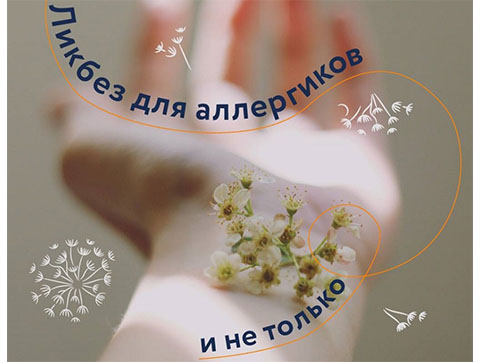Educational program for allergy sufferers and not only

Can allergies be cured?
We understand all the nuances and dispel myths together with the allergist-immunologist K+31 on Lobachevskogo Kovrygin Sergey Ivanovich.
Allergies can be treated. To do this, we use different methods, including retraining the immune system for a long time with the help of special allergen-specific immune therapy. Such therapy does not work for all allergies, but can help many patients not suffer every season.
The effect of therapy persists for a long time, but the result directly depends on the individual characteristics of the body. For this reason, before starting, special molecular testing is carried out, thanks to which we can predict the effectiveness of the treatment.
There are many diseases that look like an allergic process, but in fact it can be rheumatological, genetic diseases, infections, and others that are treated by immunologists. But it's not an allergy.
If a person starts treatment for an allergy based only on the symptoms, the therapy may not work because it may not actually be an allergy.
Moreover, allergies often progress, and without proper therapy, the condition and reaction of the body begin to deteriorate. Medications stop helping, new symptoms appear and internal organs suffer. Therefore, allergies cannot be tolerated.
Is it possible to accustom the body to allergens?
This is the principle of ASIT therapy (it works only for certain allergens and contains their microdoses). Such therapy is safe, standardized and carried out under the supervision of a specialist. But if you practice a method in which the patient himself tries to accustom himself to the allergen, the consequences can be extremely sad: anaphylactic shock and the intensive care unit.
Is there an allergy to the sun?
Under "allergy to the sun" can mean a variety of diseases. Photodermatitis, photosensitivity, solar urticaria. All these diseases are not allergic in nature, but are also treated by an allergist-immunologist.
Can you be allergic to all cats or dogs except your own?
This can happen, but not always. There are patients with such a pronounced reaction that they have to part with the animal.
Do I need to drink coal and other sorbents against allergies?
It is not necessary to expect the effect of any such funds. It's anti-scientific. There is a standardized therapy for allergic diseases.
Can there be an allergy to apple and birch?
Yes, such an allergy is called cross. It is detected through laboratory tests. Each allergen, like a nesting doll, consists of allergenic components. There are many other components inside the birch allergen. And a person has antibodies to some, but not to others. These antibodies react to other allergens, such as in apple or celery.
It is important for us to identify this connection in the patient in order to warn against an allergic attack when he does not expect it.
Is it true that in order for an allergy to manifest itself, one must encounter the allergen at least twice?
This is true, having met with the allergen for the first time, the immune system begins to produce antibodies that remove substance X from the body. But the antibodies themselves remain in the blood, so the next time they will give an allergic reaction.
Why are allergies more common now?
One of the theories is hygiene. The fact is that probably earlier immunoglobulins E (antibodies) were produced mainly to fight infections caused by large parasites. Now a person meets with them extremely rarely. Therefore, one of the theories of the spread of allergies is an overabundance of sterility. Antibodies switch to pollen, food, etc.
I recommend that parents do not create a sterile artificial environment around the child. Let the child crawl, communicate with animals, walk on the street, so that his immunity expends its strength on other enemies.
Can you outgrow an allergy?
Yes, you can. There are some allergens for which it is statistically proven that the reaction to them decreases or completely disappears with age. This is especially true for food allergies.
Are there hypoallergenic animals?
Absolutely hypoallergenic animals do not exist. Hypoallergenic animals are those that exude fewer allergens rather than those that don't exude at all, such as some types of dogs and cats that don't have an undercoat. But you need to remember that allergies develop not only to wool, but also to other components: particles of skin, secretions, etc.
What is the difference between a pseudo-allergy and a true allergy?
Pseudo-allergies can occur if a person has overindulged in certain foods, such as strawberries. But it is important to distinguish this condition from a true allergy. Only a specialist can do this. If it was in fact a pseudo-allergy, reducing the amount of the product will get rid of the problem.
What to do if an attack occurs?
In fact, you should not count on the effect of an antihistamine at 100%. It may muffle the symptoms, but an allergic reaction will develop. And it may seem that everything is fine, and then again the person is in serious condition. Therefore, you should not believe the advertisements that say: take a pill and forget it.
